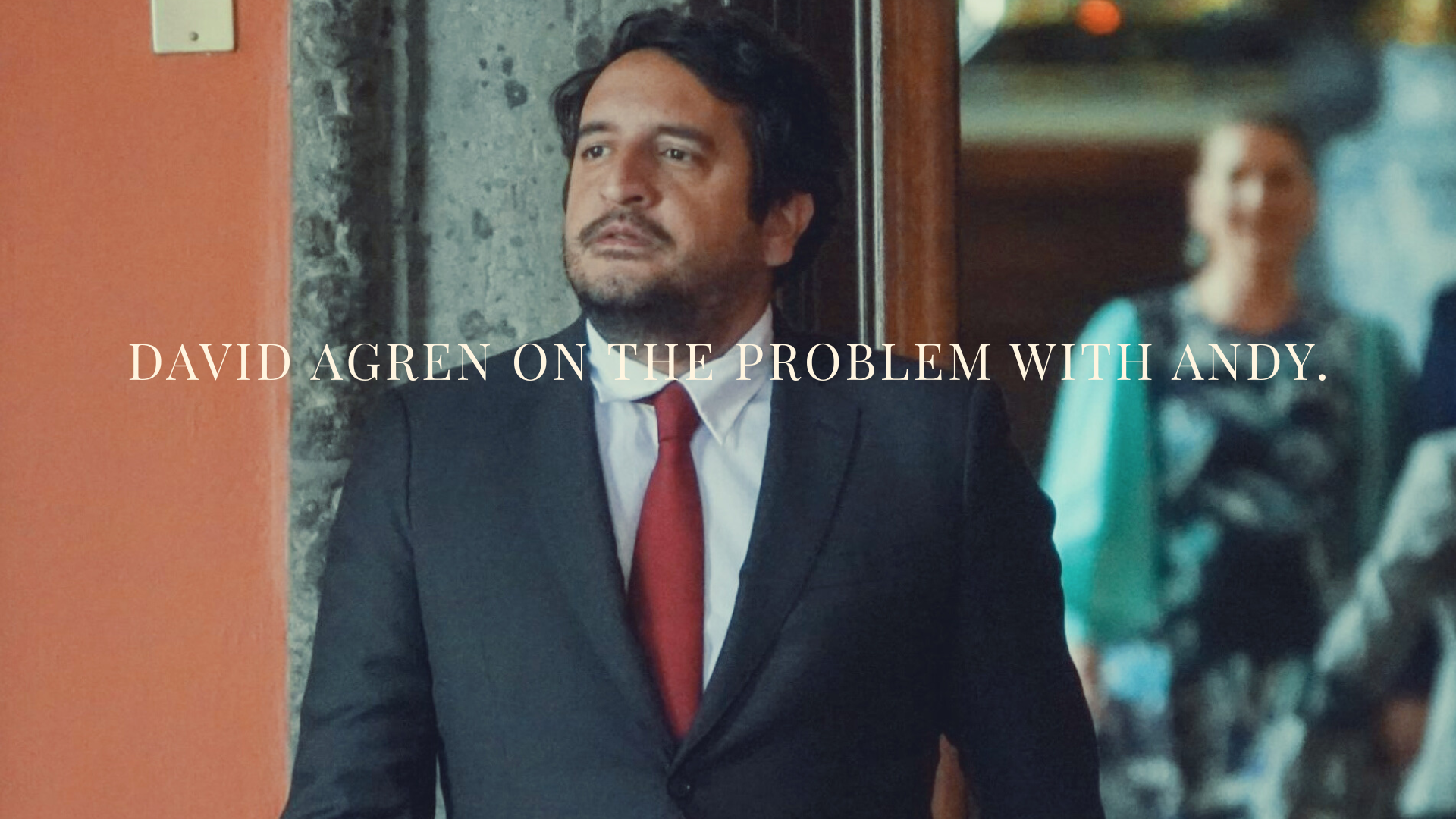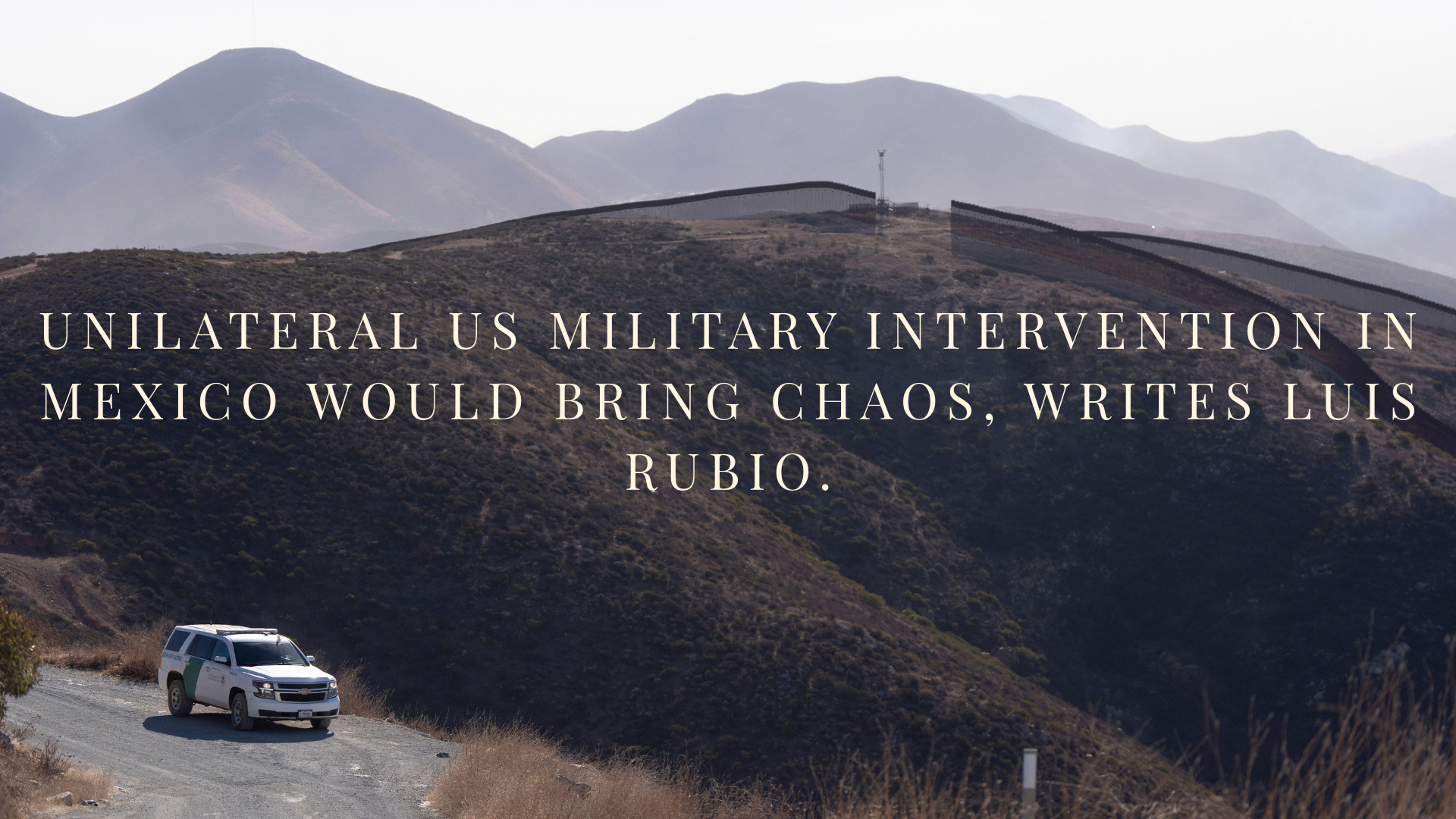
Sheinbaum at one year: A ‘complex’ operator emerges
by David Agren, writer-at-large.
President Claudia Sheinbaum swore the oath of office one year ago in a ceremony laden with symbolism as she became Mexico’s first female president. Flanked by female cadets, she took the sash from Infigenia Martínez – a prominent figure on the Mexican left and trailblazer for women in Mexican politics – as lawmakers in the lower house of congress chanted, “¡Presidenta!”
She unveiled the logo for her government, featuring an Indigenous woman. She assumed the presidency with a crushing electoral mandate, capturing more than 60 per cent of the popular vote in the June 2024 election – the highest total since the heyday of Institutional Revolutionary Party (PRI) rule in the 1970s.
But she arrived at the inauguration in the shadow of…


Unilateral US military intervention in Mexico would bring chaos
by Luis Rubio, political analyst and chairman of México Evalúa.
For months, talk has been circulating about a possible US military intervention in Mexico. The idea has gained traction here due to the presence of American intelligence ships in the Gulf of California and, more recently, the sighting of a drone over Valle de Bravo. The issue is also alive in the United States, at least since several Mexican criminal organizations were designated as terrorist groups. In fact, the debate has been simmering for years, as observers there note the growing chaos in certain regions of Mexico and the Mexican government’s seeming inaction. A recent video lays out, quite clearly, the perspective many Americans hold on the matter. No one knows if actual military action might occur — whether directly on the ground or indirectly from the air — but it is a subject that deserves careful analysis.
The video (viewable below) features Joshua Treviño at 35 seconds in. Treviño is a former US Army adviser now with America First, introduced — incorrectly — as a seasoned observer of US–Mexico relations. As I argue below, he has little to no understanding of the situation on the Mexican side…

The Morena Pact
In 1989, a series of protests and disturbances in China culminated in the massacre at Tiananmen Square, Beijing’s central plaza. The event shook not only China, but also the outside world, which had placed its hopes on reintegrating China into the community of nations. No less important, the bloodshed threatened the country’s ongoing process of economic transformation. Gradually, internal peace was restored, and an implicit social pact was forged that became the cornerstone of the spectacular economic growth that followed. That pact consisted of an implicit exchange: the government would do whatever was necessary to ensure rapid economic and living standard growth, in return for the population’s acceptance of the Communist Party’s exclusive rule and a commitment not to challenge the political system. The result was staggering.
Although Mexico is not — and cannot be — like China, Morena has been gradually advancing toward a similar arrangement, also implicitly. The Morena pact, articulated over the course of the previous sexenio, reveals not only the nature of Morena, with its dogmas and factions, but also the country’s current moment. One way to describe it is as a tacit agreement whereby the population accepts that there will be no economic growth, jobs, or a functioning health system in exchange for the continuation of social programs and cash transfers.
Of course, this is not a formal agreement, nor one that is explicitly recognized, but rather a de facto exchange that was shaped during the previous administration and that now explains the two most relevant factors in national politics: first, the president’s high popularity, and second, the elevated consumption levels among Mexico’s lower middle class — the primary beneficiaries (and clientele) of the government.
This also explains…

Sheinbaum’s monologue diplomacy is meeting Washington’s deaf ear
by David Agren, writer-at-large.
Shortly after rumours started that Ovidio Guzmán – son of imprisoned Sinaloa cartel boss Joaquín “El Chapo” Guzmán – might plead guilty on drug trafficking charges and accept a deal with US prosecutors to turn state’s witness, influencers for Mexico’s ruling party settled on a narrative for denouncing the US government’s actions: It was negotiating with terrorists.
President Claudia Sheinbaum repeated that narrative, too. From the podium of her mañanera press conference, she objected to the deal with the younger Guzmán, while noting the lack of cross-border coordination in the plea bargaining process and reiterating her opposition to the Trump administration’s designation of six drug cartels as foreign terror organizations. "They have a policy of not negotiating with terrorists,” she said. “They decided to designate certain criminal organizations as terrorists. So let them report whether there's an agreement or not."
Sheinbaum’s comments didn’t go unnoticed. Jeffrey Lichtman, Ovidio’s lawyer, plainly stated why the Mexican government wouldn’t be a party to any plea agreement: a lack of trust dating back to 2020 and the decision to send former defence secretary Gen. Salvador Cienfuegos back to Mexico after he was indicted on drug charges in the United States.
The war of words heated up as Sheinbaum, who doesn’t let any slight go unanswered, called Lichtman’s comments “disrespectful” and promised to…

Sheinbaum is facing Trump without a compass
by Luis Rubio.
Editor’s note: Mr. Rubio is a political analyst and Chairman of México Evalúa.
—
Trump sees no need to adhere to the traditional forms and rules of diplomacy. His “mandate” is clear, and he assumes it as absolute truth. If one adds to that his tactical way of acting (with no strategy whatsoever), the result is a bull in a China shop who recognizes no limits to his actions—except what works for him. If one observes how he has handled matters like Russia-Ukraine, China, Iran, Canada, NATO, etc., it becomes evident that he strikes first and then looks for a way to negotiate an exit. Those who have succeeded in dealing with him are the ones who offer a dignified way out, as has happened with NATO, China, and even Iran. That rather obvious lesson has not been learned by Claudia Sheinbaum’s government.
For Trump, there is a specific set of objectives he wants to achieve, which are key to his electoral base. Among those, Mexico plays a central role in two: migration and drugs, especially fentanyl. Biden promoted legislation regarding fentanyl, which Trump is now using to attack financial transactions and institutions allegedly involved in the commercialization, financing, and money laundering related to this drug.
Trump and his operators have a univocal and simplistic (not to mention oversimplified) view of the issues they prioritize. They fervently believe they can solve the fentanyl problem by bombing a few labs, or the migration issue by expelling people who are illegally present in the US. Their actions involve no consideration of causes, market dynamics, or whether the proposed actions are susceptible to solving the problem. Trump believes he has the power and is convinced he can use it to solve these issues—by force if necessary.
If one looks at how he operates, it's fairly obvious how to respond…

Mexico’s democratic transition turns 25 - or only 7, if you ask Morena…
by David Agren, writer-at-large.
Morena supporters marked one of their movement’s many anniversaries on July 1: the seventh anniversary of the ruling party’s founder, former Andrés Manuel López Obrador, overwhelmingly winning the 2018 election.
AMLO’s win brought the left to power, though critics accused the new president of governing like a conservative with his initial agenda of austerity. And supporters claimed AMLO’s win finally brought democracy to Mexico, despite multiparty elections being held at all levels of government throughout this century.
“This July 1st, we proudly celebrate the day of the revolution of consciences. Long live the Fourth Transformation!” President Claudia Sheinbaum posted on X.
The so-called Fourth Transformation (4T) – as AMLO christened his movement – diligently marks anniversaries, which offer pretexts for a populist movement to mobilise its base and herd social-benefits recipients to rallies.
Mexico also marked a major anniversary – unrelated to AMLO – which passed uncelebrated: Former president Vicente Fox ended one party rule on July 2, 2000, ousting…

Mexico is paying a high price for its opposition parties’ malaise
by Gerónimo Gutíerrez.
Editor’s note: Amb. Gutíerrez served as Mexico’s Ambassador to the United States and also as Mexico’s Undersecretary for Governance.
Mexico’s political opposition today finds itself in a dire position. Since its founding in 2014, the ruling Morena Party has made extraordinary gains. It now holds the presidency, 23 of 32 governorships, comfortable majorities in the federal congress and 27 state legislatures, and, together with its allied parties (the Workers' Party, or PT, and the Green Party, or PVEM), has the power to enact laws and even amend the Constitution at will. President Sheinbaum enjoys exceptionally high approval ratings (around 70%), much like her predecessor, former President Andrés Manuel López Obrador, did.
In recent years, Morena-led governments have taken actions that appear to significantly weaken institutional checks and balances, the separation of powers, and democratic norms. To be sure, Morena and the President reject this characterization — but critics, both in Mexico and abroad, make a persuasive case. For example, the Global Democracy Index published by The Economist now classifies Mexico as a hybrid regime, no longer even a flawed democracy.
In the 2024 election, the traditional parties (PAN, PRI, and PRD) received only 27% of the presidential vote, compared to the 60% won by Claudia Sheinbaum. Currently, the PAN governs just four states, the PRI only two, and both hold modest parliamentary groups in Congress. The PRD no longer exists. Movimiento Ciudadano (MC) appears to be the emerging party. It secured a significant 10% of the presidential vote in the last election and currently governs two states. However, it is hampered by internal inconsistencies and scandals, which raise serious doubts about its long-term potential.
Under these circumstances, it is only natural to ask whether the political opposition has pursued the right strategy to counter Morena’s rise — and if not, what that strategy could look like in the future. There are no easy answers, but perhaps a few sensible working hypotheses.
In a country where 43% of the 128 million population lives in poverty (according to 2022 official figures), machine politics work. The Morena governments have built a vast platform of social programs, including direct cash transfers that reach an estimated 25 million households. Opposition parties have wavered between timidly supporting these programs and criticizing their effectiveness, political bias, and fiscal sustainability. Unless they can clearly articulate where they stand…

New rules: The 4T ushers in a new age of peak power
by David Agren.
Former PRI governor Fidel Herrera passed away recently. He was remembered for a sordid administration in the late 2000s, when Los Zetas took over the state. As the discovery of a clandestine refinery in Veracruz revealed, the state-crime nexus continues – even with Morena in power since 2018, having ousted Herrera’s Institutional Revolutionary Party.
Herrera scandalized Mexico throughout his term. He won the lottery twice while in office. And he coined the trademark phrase: “Estoy ahorita en plenitud del pinche poder” – roughly translated as “I’m at the height of my f*cking power.” A less polite translation would be a confession to being drunk with power.
The line encapsulated the impunity and abuse of authority during his term in Veracruz, which was followed by the thievery of fellow príista Javier Duarte – under whom Veracruz became a cemetery for journalists.
Morena and its allies in the so-called “Fourth Transformation” (4T) have channeled Herrera’s authoritarianism in recent weeks – even longer, according to critics – as they push as a series of reforms through congress, where they hold constitutional-proof majorities.
The 16 reforms range from changing wildlife laws to ban the use of captive marine mammals in theme parks to building platforms for boosting state surveillance capacities and a measure to allow National Guard members to seek public office (despite being under National Defence Secretariat command.)


Claudia Sheinbaum faces adversity
by Luis Rubio.
Editor’s note: Mr. Rubio as a political analyst and chairman of México Evalua.
From the moment she was nominated as Morena's presidential candidate, speculation arose regarding her capacity and willingness to break with her predecessor, as has been the tradition in Mexican politics. Although speculation has not ceased, the evidence is overwhelming: the president sees herself as an operator or implementer of AMLO’s agenda. However, circumstances have changed, and the need to respond to a scenario infinitely more complex than the one her predecessor faced (in part due to the legacy he left behind) is forcing her to increasingly take actions that he clearly disapproves of. The question then is: what comes next?
In Mexican political tradition, it was said that the outgoing ruler did not choose a successor but rather an executioner. That clearly did not happen with AMLO, who carefully selected someone with the skills to manage a government, but not to undertake bold political initiatives. Which of these paths will prove true? So far, there is no doubt that AMLO’s logic dominates the landscape. At the same time, it’s not clear what the true profile of the government led by Sheinbaum actually is.
Boz, a publication focused on Latin American governments, conducted an interesting analysis of Claudia Sheinbaum.

